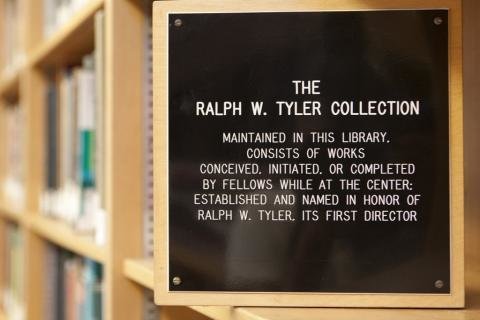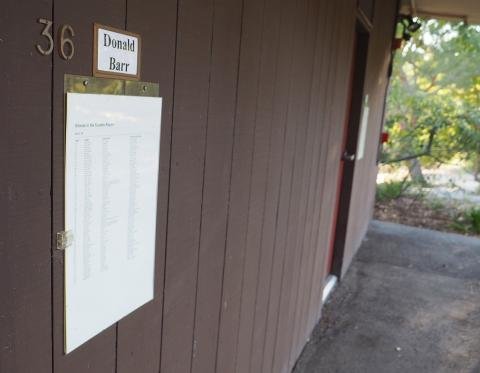The collaboration draws inspiration from the Center’s renowned Tyler Collection of books as well as former fellows who exert an enduring intellectual impact.
View published work as part of the partnership
CASBS is pleased to announce a partnership with Public Books, an online magazine that publishes essays, interviews, and other creative works that engage serious scholarship and critical issues while bridging gaps between the academy and the public.
Public Books was founded in 2012 by Caitlin Zaloom and Sharon Marcus, who serve as co-editors-in-chief. Zaloom, a cultural anthropologist based at NYU, was a CASBS fellow during the 2016-17 academic year. During that period, she and CASBS director Margaret Levi began chatting informally about ways the two organizations might team up. After Zaloom returned to New York, the conversations simmered, then revived this year with a couple of concrete ideas worth pursuing.
The new partnership considers books and ghosts that occupy the Center’s hilltop campus.
First the books. Since it opened its doors in 1954, nearly 2,000 books have been initiated, drafted, or completed by fellows while in residence at CASBS. The books reside in the Center’s Ralph W. Tyler Collection – one of the world’s great assemblages of post-World War II scholarship in the social and humanistic sciences, and named after the Center’s first director. Some Tyler books are pioneering, foundational works that, across decades, still influence academic research, contemporary thought, and public discourse. Others, written by recent fellows, hold similar potential to influence over time but definitely command our attention right now.

The partnership examines both types of Tyler books on an ongoing basis. A series of essays, published in Public Books, will put a spotlight on Tyler classics, reflecting on their enduring significance. Other features, frequently in the form of author interviews, will focus on select recent accessions to the collection.
“Those of us privileged to have spent a lot of time at the Center know full well what a jewel the Tyler Collection is,” said CASBS director Margaret Levi. “I’m just thrilled that this collaboration will shine a light on some of its books and the brilliant scholars who worked on them as CASBS fellows.”
It’s the right partner, too.
“Public Books attracts deserved recognition for showcasing scholarly depth in the service of generating new ideas and discussions, connecting with intelligent and concerned people outside academia, and breaking through disciplinary boundaries and barriers,” said Levi. “What Public Books does in the digital publishing space aligns perfectly with what we try to do as a center for advanced research. We’re proud to associate with PB.”
The CASBS-Public Books kickoff piece focuses on a recent entry into Tyler. Interviewer Neta Alexander engages Margaret O’Mara, author most recently of The Code: Silicon Valley and the Remaking of America(Penguin Random House, 2019). O’Mara initiated work on the book as a 2014-15 CASBS fellow.
And then there’s the ghosts. Today’s CASBS fellows work in and enjoy the same offices, or studies, in the same mid-century buildings enjoyed by CASBS fellows 65 years ago. In fact, each office displays a “Ghosts in the Study” list that denotes the name, discipline, institutional affiliation (at the time of fellowship), and year of occupancy for each fellow in each study dating back to the Center’s beginning. Many of those former fellows, of course, are alive and kicking; others, well, not so much. But all are ghosts in the CASBS studies. The ghost lists have turned-out to be pretty cool attractions for visitors to the Center. Some fellows specifically choose their studies based on ghosts.
Accordingly, the partnership also devotes attention to prominent study ghosts. Each year, a few current CASBS fellows will write, for publication in Public Books, reflections on ghosts in their studies – the ghosts’ enduring impact on their own intellectual development as well as on their field and/or social science at large. First up: 2019-20 fellow Catherine Ramírez, the current occupant of CASBS study #51. She will write about one of that study’s previous occupants, Alejandro Portes, a 1980-81 CASBS fellow and National Academy of Sciences member renowned for his research on immigration and contributions to cultural sociology, economics sociology, and race and ethnicity studies. (View the Ghosts in the Study #51)
For Caitlin Zaloom, herself a ghost in study #36, this part of the partnership with CASBS is personal.
“I was so taken with two ghosts in my own study – Talcott Parsons and Carol Stack. They were so very different, but both shaped my own trajectory profoundly,” she said. Parsons occupied study #36 in 1957-58; Stack in 1987-88. (View the Ghosts in the Study #36)

Zaloom wants current CASBS fellows writing about their ghosts to tap into a similar feeling.
“What do these former fellows mean to them, both personally and intellectually? That could begin with the moment of discovery,” she said. When did they first encounter the work? What drew them to it? How did it shape their own views and research? Why do we need to know about these ghosts?”
In revealing the answers, bonus points for fellows who bring stories or anecdotes that help illustrate the power of their relationship with a ghost. But it’s more than enough to simply explore the rich personal/intellectual impact and legacy of a ghost in one’s study, connecting fellows over time through CASBS.
“Building on – and sometimes against – others’ works is so much part of our ideas, but it isn’t talked about nearly enough in the very personal ways it affects our own work,” says Zaloom. “The collaboration with CASBS gives us a fun and enriching way to delve into that a little.”
View all published work associated with the CASBS-Public Books partnership.
